Complete Guide To Salesforce B2C Commerce Cloud Implementation Guide
Table of Contents
Going digital for a retail enterprise isn’t a go-to choice anymore but necessary. According to Oberlo’s 2023 study, 2.64 billion digital buyers globally, one of every three people is an online shopper. So, if you’re no longer present online, consider yourself a non-current customer.
And what’s the solution to experience unforgettable online shopping experiences? Of course, Salesforce B2C Commerce Cloud. Whether you’re a seasoned retailer or just a newbie, this traction seeker platform has everything you need to drive sales, engage customers, and build brand loyalty like never before.
We’ll explore groundbreaking features, innovative tools, and unrivaled capabilities of Salesforce B2C Commerce Cloud. From seamless website design and personalized customer journeys to robust inventory management and powerful marketing automation, this dynamic platform empowers you to exceed customer expectations and boost your bottom line.
But that’s not all! Whether you’re looking to optimize conversions, expand your customer base, or stay ahead of the competition, this guide is your roadmap to e-commerce success.
Let’s get started!
What is Salesforce B2C Commerce Cloud?
Salesforce B2C (Business to Customers) Commerce Cloud is a seamless eCommerce and Cloud-based platform. It is designed to accomplish one common goal – to provide business value, unlock new opportunities, drive sales, and automatically maximize lead conversions.


But that’s not enough! You can create a personalized shopping experience for your potential customers across various verticals. Salesforce B2C Commerce Cloud power packed with a suite of reliable features and tools to deliver exceptional e-commerce experiences and drive revenue.
So, if you struggle to deliver seamless communication, the Einstein AI engine behind the B2C platform has the solutions. It empowers you to install extensions to deliver your customers a personalized experience, increasing sales and conversions.
Features of Salesforce B2C Commerce Cloud
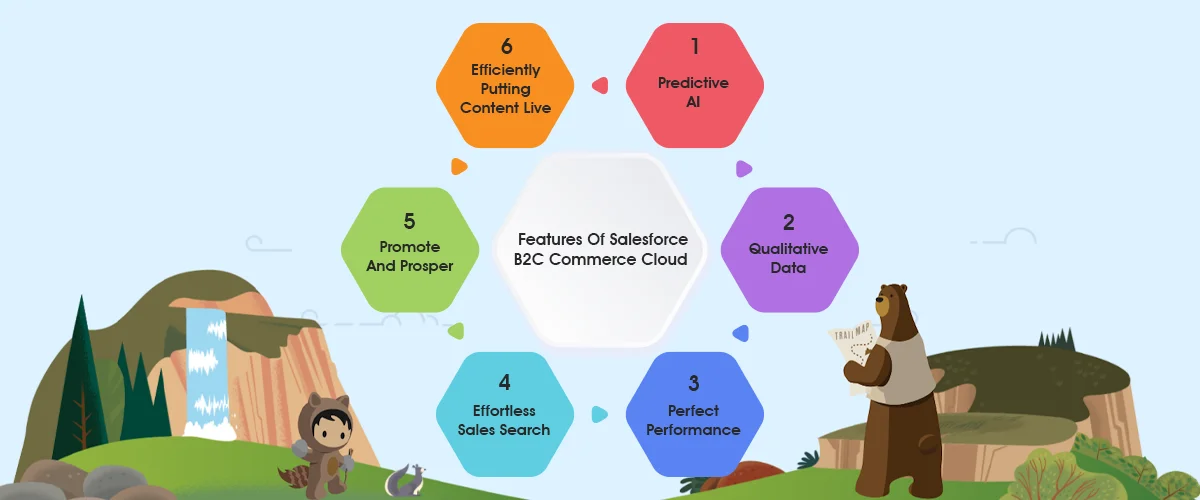

1. Predictive AI
According to a McKinsey report, 76% of customers love purchasing from companies offering personalized solutions.
Einstein AI in Salesforce B2C Commerce Cloud empowers you to tailor your shopping experience with better product recommendations and streamline your upselling. By unlocking the power of SFCC predictive AI, you can analyze visitors’ behavior, product sorting, and recommendations.
From personalized product recommendations to targeted marketing campaigns, it maximizes engagement. With Predictive AI, businesses can drive sales and foster lasting customer relationships.
2. Qualitative Data
Quality-centric e-commerce site content ( product descriptions, reviews, blog posts) enhances the site’s visibility on search engine results pages. This ranking drives organic traffic and boosts conversion rates. Providing high-quality and credible information helps you build good relations and gain the trust of your potential customers.
To have a user-friendly, seamless experience, you need to leverage the platform capabilities, such as:
– Product Model:
Salesforce B2C Commerce Cloud backs a “Variation Model,” empowering customers to select product “Variations” (e.g., size, color, fabric type, and more) on the same page.
Have you ever had the shopping experience of switching pages for different colors of the same product? Not a fun experience. The Salesforce B2C Commerce Cloud’s Product Model eliminates this challenge.
– SEO Meta Tags:
You want to provide quality information to Search Engines in a structured way and ensure social sharing fetches the relevant images and right product descriptions. You can win the game with the “Meta Tag Rules” functionality.
These top-notch features are just the tip of the iceberg. It shows a qualitative data flow of your products in the Salesforce B2C Commerce Cloud architecture.
3. Picture perfect Performance
The Dynamic Image Service (DIS) of Salesforce B2C Commerce Cloud is designed to enhance and streamline product images across all channels. Leveraging the DIS functionality allows you to scale and deliver high-resolution images on different devices and browsers.
The most prominent features of DIS include image cropping, resizing, and format conversion, contributing to optimizing SEO performance.
A quick tip: Ensure the quality images resonate with your brand’s vision and mission, providing the best site experience. Balancing both can be a time taking but worth the effort.
4. Effortless Sales Search
Launching new products is useless until the customers won’t find them on their desired channels. Salesforce B2C Commerce Cloud comes with a suite of reliable features helping you optimize your search results.
- Synonyms: It works wonders for businesses when wisely used in the content. Group words are listed in the commerce cloud architecture, allowing customers to get results with the same results.
- Hypernyms: Some words can be fetched with similar meanings. Such as, Kurta is a type of clothing, and mobile is a type of electronic device.
- Compound words: Create words by combining two or more words, and use symbols to identify where they can be separated.
- Suggestion phrases: Adding extra suggestions for phrases around the keywords helps customers get the right screen data.
- Term exclusion: Kick out the unnecessary, irrelevant, and rowdy words that are of no use in the content.
- Common phrases: A winning deal that comes with packages and won’t be separated.
- Stop words: Avoid transitional words and stuffing that do not help customers to search for the right content.
By following this approach, you can ensure customers search for the desired results faster than before. Salesforce B2C Commerce Cloud reports on what customers actually search and adjust the above features accordingly to ensure “no results” are history!
5. Promote and prosper
Promotions are useful practices to retain customers, drive sales and attract new prospects. Salesforce B2C Commerce Cloud provides different promotions (discounts, coupons, gifts, free shipping, etc) opportunities that cater to business requirements.
Here are some quick win tips:
- Plan seasonal-based promotions with defined dates, times, and duration
- Prepare a list of creative assets and products you want to release promotions
- Create a promotion calendar with comprehensive details
- Test your promotions thoroughly before execution
- Set up clear workflows for clearly reviewing, releasing, and building online promotions
6. Efficiently putting content live
Replication allows you to push defined data or code from a source (staging) to a target instance(development and production). In the staging instance, you can create content, configure promotions, and manage the search. In contrast, development or production instances allow you to live client websites.
Things to consider to ensure the procedure smoothly goes on:
- Create a step-by-step guide for the replication process for future use.
- Test the staging environment before initiating a production environment.
- Always synchronize data, especially in peak hours, to avoid last-moment disturbance in customer experience.
- Avoid scheduling during data imports
- Run daily backups on Staging
Steps for Implementing Salesforce B2C Commerce Cloud
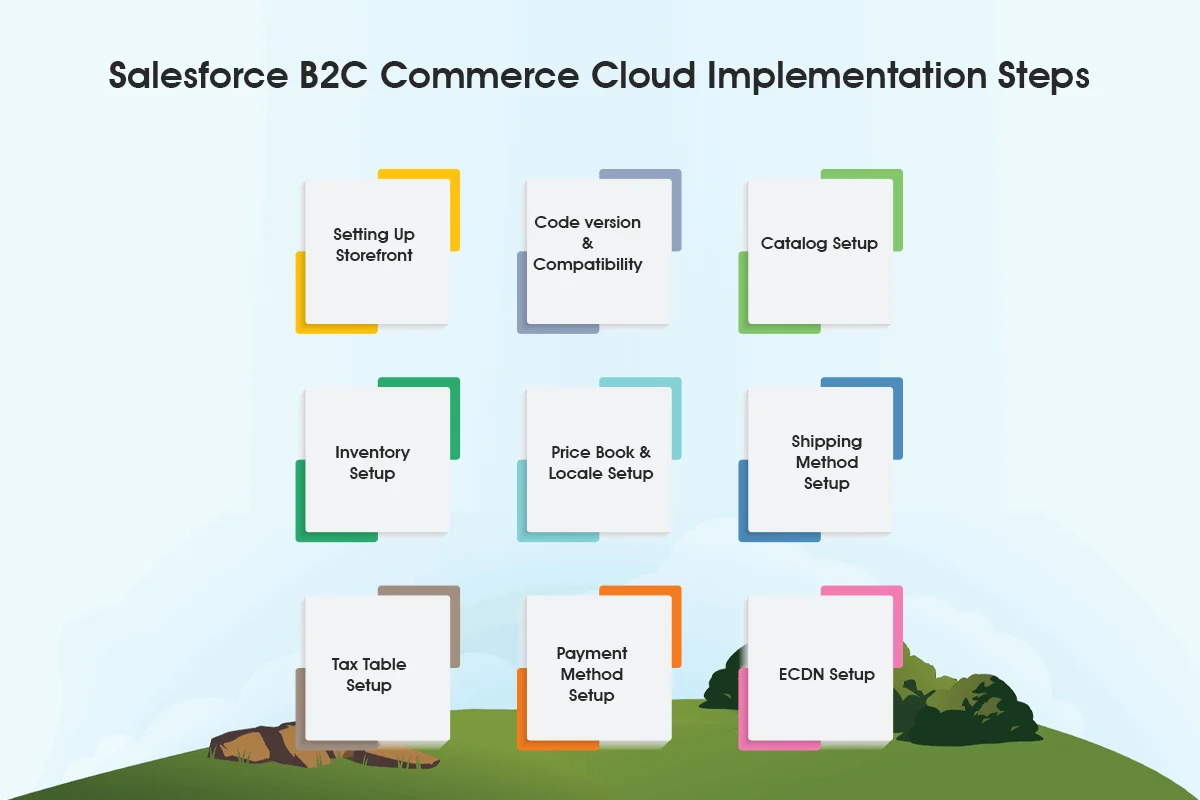

Step 1: Setting up a storefront
In Business Manager go to Administrator ->Sites-> Manage Sites -> New Site -> fill in the necessary information.
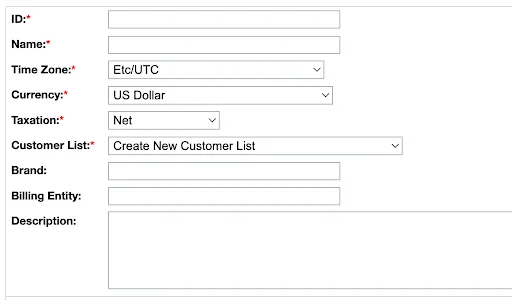
Step 2: Code Version and Compatibility
Go to Administration -> Code Deployment -> Create a new code version while selecting the appropriate compatibility mode and upload the necessary cartridges for your storefront and integrations.
Step 3: Catalog setup
BM -> Merchant Tools -> products and catalogs -> catalogs
Click on the “edit” button of the catalog you want to use on your site, go to “site assignments” select the site, and click on “apply”.
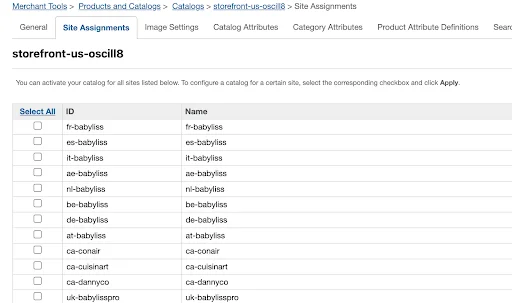
In case you want to create a new catalog
BM -> merchant tools -> products and catalogs -> catalogs
Scroll down and click on new and fill in the necessary information.

Step 4: Inventory setup
BM -> merchant tools -> products and catalogs -> inventory
Click on the “edit” button of the inventory list you want to use on your site, go to “site assignments” select the site and click on “apply”.
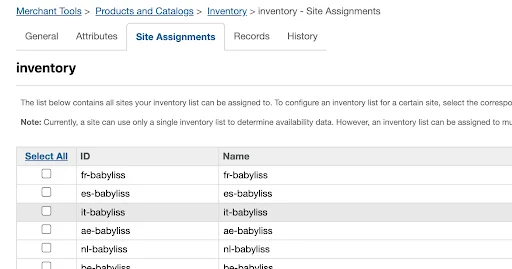
In case you want to create a new inventory
BM -> merchant tools -> products and catalogs -> inventory
Scroll down and click on new and fill in the necessary information.
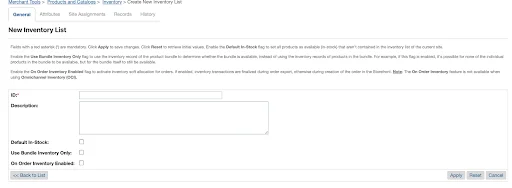
Step 5: Price book and locale setup
BM -> merchant tools -> products and catalogs -> price books
Click on the price book list you want to use in your site, go to “site assignments” select the site and click on “apply”
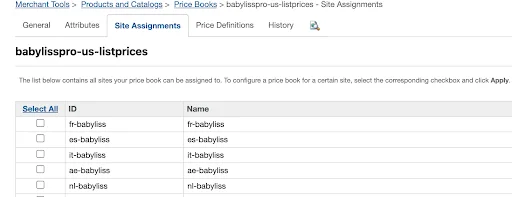
In case you want to create a new price book
BM -> merchant tools -> products and catalogs -> price book
Scroll down and click on new and fill in the necessary information.
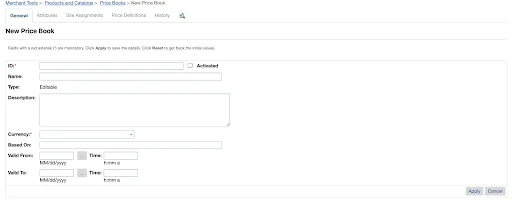
For assigning the locale –
BM -> merchant tools -> site preferences -> locales
Select the locales and apply
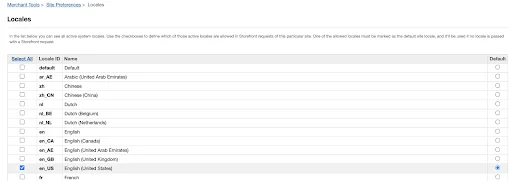
For creating a new locale –
BM -> Administration -> global preferences -> locales
Scroll down and click on new and fill in the necessary information.

Step 6: Shipping method setup
BM -> merchant tools -> ordering -> shipping methods -> new shipping method
Fill in the necessary information.
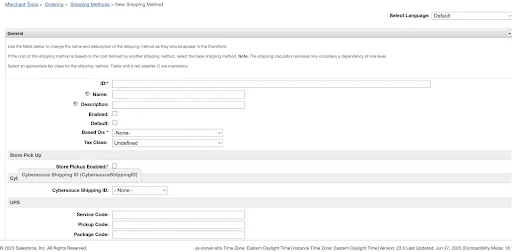
Step 7: Tax table setup
BM -> merchant tools -> ordering -> Taxation settings -> tax jurisdiction
Click on new and fill in the necessary information.

Go to tax rates and you can set the tax rate for a tax jurisdiction based on tax classification.
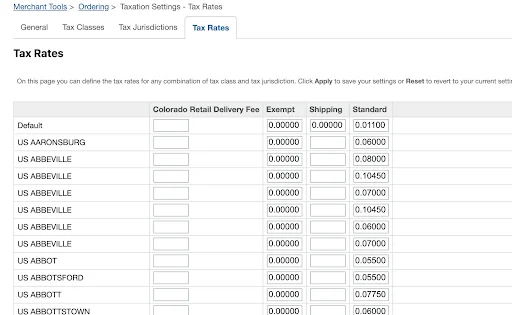
Step 8: Payment method setup
BM -> merchant tools -> ordering -> payment methods
Give the name of the payment method and enable it, then assign it a processor you want to use.
Step 9: ECDN Setup
1. Setup Aliases
Go to Merchant Tools > SEO > Aliases and set up the aliases for the storefront with the following JSON object that includes the hostname that the storefront needs to open according to this format.
2. Go to Administrator > ECDN Settings

3. Create a new zone.
4. Add a new Hostname and configure an SSL certificate for the hostname of the storefront.
Some Interesting Facts about Salesforce B2C Commerce Cloud
A study by Oberlo reveals 80 million more buyers suspected in 2023 than last year, which means a rise of 3.1% year-over-year.
Online shoppers continue to grow, rapidly rising to 2.71 billion in 2024 and 2.77 billion in 2025.
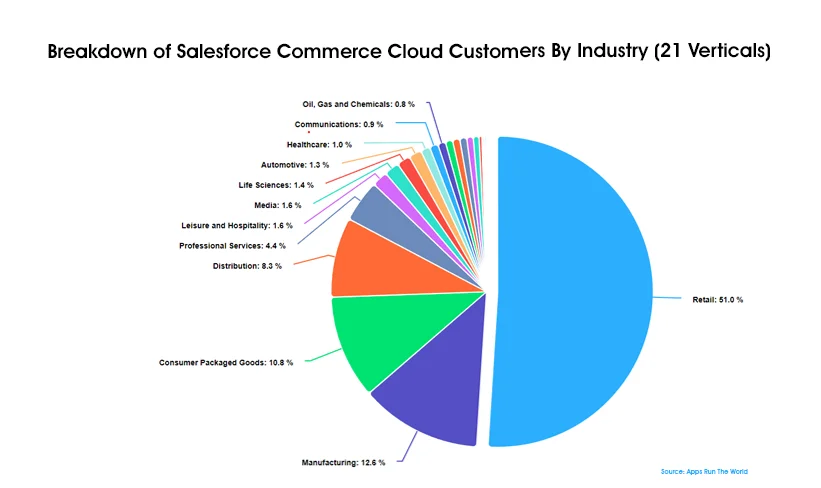
A 2023 study by GlobalData reveals B2C e-commerce market size is projected at $6.5 trillion in 2023 and is expected to increase by 9.1% during the forecast period 2022-2026.
B2C (Business to Consumer) market size is expected to reach $8.3 trillion by 2026.
By 2023, B2C e-commerce online payment services have emerged as a dominant force in the market, accounting for a significant share of total revenues. Analysts predict the segment will continue to thrive, with a projected annual growth rate (CAGR) of over 10%. As a result, by 2026, it is expected to reach a market value of Rs 7,891.6 billion.
Salesforce B2C Commerce Cloud Pricing
Pricing is crucial when opting for Salesforce B2C Commerce Cloud to optimize customer experience, deliver a better storefront experience, and maximize business revenue. You can pick the best plan that caters to your business requirements and meet your budget criteria.
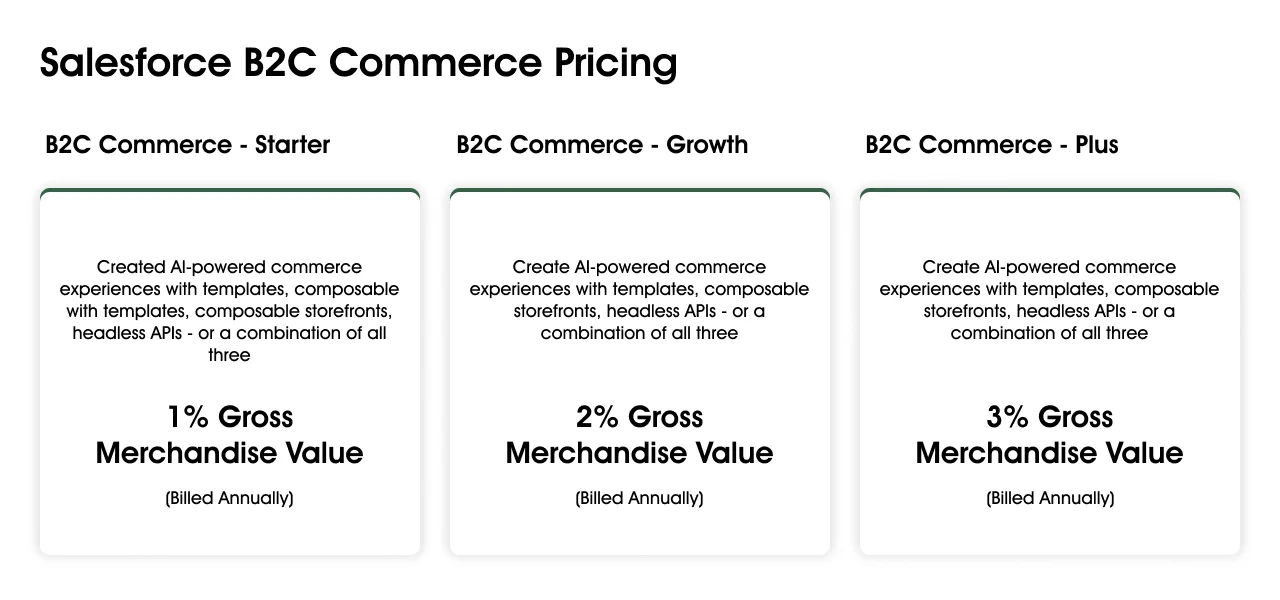

Industries and Companies Using B2C Commerce Cloud
Salesforce B2C Commerce Cloud is not in the limelight for small-scale businesses. Some large ecommerce brands and industries such as Amazon (generating $513.98 billion in revenues), L’oreal, Guess, ECCO, Puma, and well-known brands have already embraced the platform capabilities at their core.
From empowering you to expand your customer base and digital presence for industries including retail, manufacturing, banks, education, non-profit business, and healthcare, Salesforce B2C Commerce Cloud covers you.
Let’s glance at some industries leveraging the platform for optimizing customer experience and high ROI.
- Cosmetic industry: The popular brand L’oreal leveraging B2C Commerce Cloud for Einstein AI recommendations. This helps brands in delivering an exceptional online storefront experience to their customers. Ensure generating 15% to 20% more sales.
- Sports industry: The company which maximizes organic traffic has given Salesforce B2C Commerce Cloud a try to improve storefront reference architecture. Since then, mobile sites have rolled faster than before by 69%, and images load in less than 2 seconds. Top of the above, their website speeds boost up, and it takes less than 3 seconds to show results to their customers.
- Clothing industry: Guess the famous clothing brand wants to boost its online traffic. Hence, they have migrated their in-house ecommerce stores from 48 countries to Salesforce B2C Commerce Cloud. With this one decision, they have observed a sudden spike in website loading speed by 72% and conversion rates by 60%.
- Retail industry: Costco Wholesale Corporation, with 304000 active employees leveraging SFCC and generating $226.95 billion by delivering an exceptional storefront experience to their potential customers. You read aloud our real-world customer success story.
- Insurance Industry: US-based Humana Inc. insurance organization unlocks the capabilities of Salesforce B2C Commerce Cloud, resulting in revenues of $92.87 billion.
Curious to explore real-world examples that Cyntexa helped in? Explore our Customer Success Stories.
How Salesforce B2C Commerce Cloud Stimulates Business Growth?
The ecommerce industry is all about maximizing sales in every possible way. Yet, this objective consists of a counterpart: “perks” or “advantages.” So, here we have compiled the benefits you can leverage from Salesforce B2C Commerce Cloud.
1. Smart AI-powered data analysis
With smart AI-powered SFCC, you can get a 360-degree view of your customer’s requirements and behaviors. This will give you an understanding of their actual needs. So you can use these insights to deliver personalized solutions or relevant offers.
For instance, Einstein commerce insights empower you to examine shopping cart and their purchase history. The best thing about this analysis is you won’t have to integrate any third-party applications to capture customers’ data.
2. Improvise the shopping experience
Product recommendations, predictive sorting, and advanced search suggestions through SFCC are the best practices for engaging and attracting new clients. It enhances the online and in-store customer journeys, ensuring a seamless shopping experience. Also, it’s factually recorded that shoppers who click and collect option 25% chances they purchase some additional goods from the store.
3. Boost marketing efficiency
Salesforce B2C Commerce Cloud provides an advanced toolkit for easy marketing and simplified merchandising, empowering you to resonate with your promotional activities.
You can ensure data orchestration with quality content, simplified products, and price management. This means managing multiple sites, currencies, and localizations from a centralized place is just the right thing in customers’ hands. Additionally, these platform features help you display the right product to the right customers, increasing customer rates.
Moreover, built-in SFCC targeting and A/B testing tools are another best approach to drive more engagement. Also, you can launch, supervise, analyze, and adjust your precise marketing campaigns.
Check how B2C Commerce Cloud can help businesses Increase Sales.
4. Enhance customization
Customers opt for the option of ensuring personalization and customization. Yet creating eye-captivating ecommerce websites is not a cakewalk. But with the “Page Designer” feature, you can design lucrative pay layouts, templates, web pages, themes, and components. Another way for an engaging website is to choose pre-built themes that align with your business brand.
You can drag and drop carousels, banners, and other available components in just one click to create a page. Before making it live, you can review the page to be perfectly designed or need any improvements.
5. Device compatibility
According to Explodingtopic research, 4.3 billion people access the internet on mobile devices. This shows primarily users leverage mobile devices to access information.
Salesforce B2C Commerce Cloud ensures your online store is highly compatible with mobile devices because of website responsiveness. So, your site will give users the exact look and feel of a desktop on a mobile screen. Another benefit you can unlock is getting a high ranking in your ecommerce store because Google prioritizes mobile-first devices.
So while developing web pages in Page Designer, you can preview your website’s appearance on mobile devices.
6. Better customer support
Forrester’s research reveals that potential customers dedicate approximately 35% of their time to searching for relevant information across multiple documents. Additionally, they waste about 15% of their time copying and pasting data from one location to another.
Furthermore, nearly 10% of their time is spent seeking answers from experts. With such time-consuming activities, little remains for engaging with customers.
Salesforce B2C Commerce Cloud addresses these challenges by providing enhanced customer visibility, eliminating guesswork, and facilitating informed decision-making through real-time data and insights.
Moreover, SFCC empowers support representatives to deliver customer-centric services, resulting in a 25% reduction in call duration and a 10% decrease in case volume.
7. Increased data security
Salesforce B2C Commerce Cloud provides businesses with a robust and secure platform that prioritizes increased data security. The platform ensures high data confidentiality, integrity, and availability of sensitive customer information with advanced security measures. It complies with industry standards such as GDPR and PCI DSS, guaranteeing that data is handled under established security guidelines.
Granular access controls enable organizations to define user permissions, limiting data access to authorized personnel. Data encryption techniques also protect information during transit and at rest, rendering it unreadable without the appropriate decryption keys. The platform’s monitoring and auditing capabilities allow businesses to track user activity, detect potential security breaches, and address them promptly.
By prioritizing data security, SFCC helps businesses establish and maintain customer trust, providing a secure environment for online shopping and ensuring the confidentiality and protection of valuable customer data.
Why Hire a Salesforce B2C Commerce Cloud Implementation Partner?
Implementation involves too many convoluted tasks requiring skilled people for seamless execution. Hence, hiring a Salesforce Commerce Cloud Implementation Partner can unfold a suite of benefits for your business.
Let’s look at some of the key benefits why you should consider it:
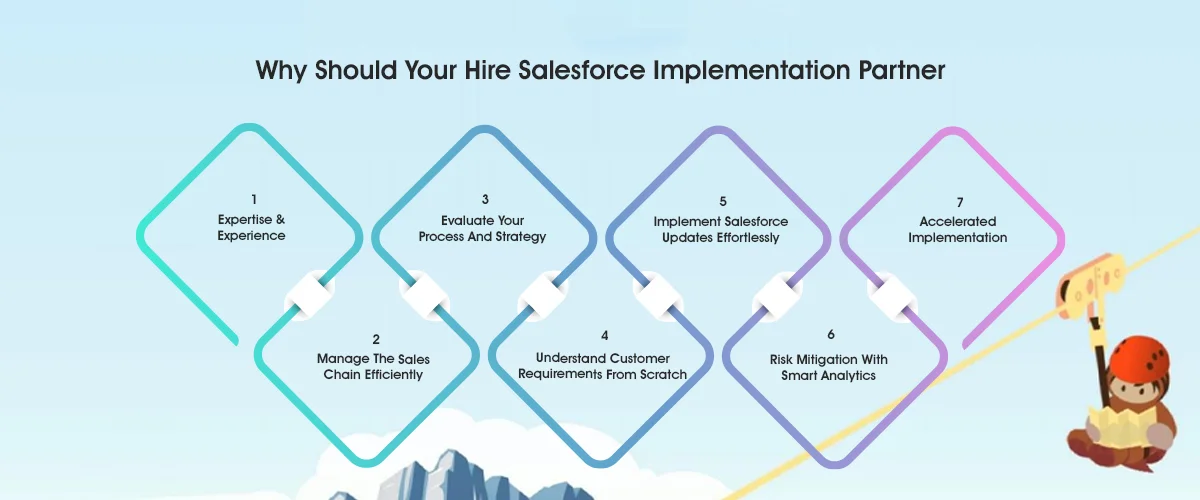

1. Expertise and Experience
Partners are experienced professionals with in-depth knowledge of platform capabilities. That makes a huge difference to opt for implementation partners instead of hiring an individual. They know the technical know-how and utilize their full potential to design and bring business-oriented solutions that resonate with your unique requirements.
2. Manage the Sales chain efficiently
Your CRM may require additional applications to bring efficiency and productivity to your business. Hence, what’s better than choosing a B2C & B2B SFCC implementation partner? They can help you optimize your sales chain by integrating it with other Salesforce software, such as Sales Cloud or Service Cloud. This integration enables seamless data flow, enhanced collaboration, and improved customer experiences throughout the sales process.
3. Evaluate your process and strategy
Implementing B2C Commerce Cloud empowers you to evaluate and identify your existing process and strategies. The right partner can assess your present workflows, address the challenges, identify room for errors, and recommend out-of-the-box solutions aligned with business objectives. Not only this but helping you to streamline and optimize your process to drive more revenue and success to your business.
4. Understand customer requirements from scratch
Putting yourself in the customer’s shoes is crucial for delivering customers the personalized and tailored solutions they expect with the right SFCC implementation partner. They can closely work with you to understand root-level information, such as your target group, needs, preferences, and challenges. Partners can design and implement solutions that meet your business requirements with this insight.
5. Implement Salesforce updates effortlessly
Salesforce is a rapidly growing technology that releases updates and features to enhance the platform’s functionality. Staying updated with the new release can be a challenge. But with the right partner, you can expect a seamless update process that minimizes potential workflow disruptions.
6. Risk Mitigation with Smart Analytics
Partners have access to sophisticated analytics tools and can help you gather valuable insights from your data. By analyzing customer behavior, sales patterns, and other metrics, they can identify trends, anticipate risks, and provide data-driven recommendations to mitigate potential issues. This proactive approach helps you make informed decisions and reduce risks effectively.
7. Accelerated Implementation
With a partner, you can expedite the implementation process and get your B2C Commerce Cloud solution up and running faster. Their expertise in the platform allows them to streamline the implementation process, saving time and ensuring a smooth transition.

Are you Ready to Transform your Ecommerce Business?
Salesforce B2C Commerce Cloud empowers businesses to excel in the dynamic world of e-commerce. With its wide range of features, integrations, and AI-driven insights, companies can deliver exceptional customer experiences and drive revenue growth. Also, optimize online stores for SEO (Search Engine Optimization), maximize conversions, improve customer satisfaction, and more.
Whether you’re a small business or an enterprise-level organization, harnessing the potential of Salesforce B2C Commerce Cloud can take your online business to new heights.
So, embrace this transformative platform, adapt to changing customer expectations, and unlock endless possibilities for your e-commerce success by getting the right Salesforce implementation services.
Don’t Worry, We Got You Covered!
Get The Expert curated eGuide straight to your inbox and get going with the Salesforce Excellence.
Frequently Asked Questions
Promotion, Product information, Product/Services and delivery reviews/testimonials are the key silent aspects of B2C Commerce Cloud.
Regarding naming the top three B2C commerce software development tools, Business Manager, Microsoft Visual Studio Code, and the Commerce Cloud Storefront Reference Architecture (SFRA) have gained the most votes. They simplify the overall customer experience by delivering a personalized experience.
The usage of SFCC is not limited to large enterprises or small online stores, but any business that wants to expand its digital presence and online customer base can leverage it. Its usage extends beyond clothing, sports, healthcare, retail, and manufacturing.
B2C, or Business to Consumer ecommerce, is a customer-oriented platform. It is a business model involving sales between online businesses and customers.









